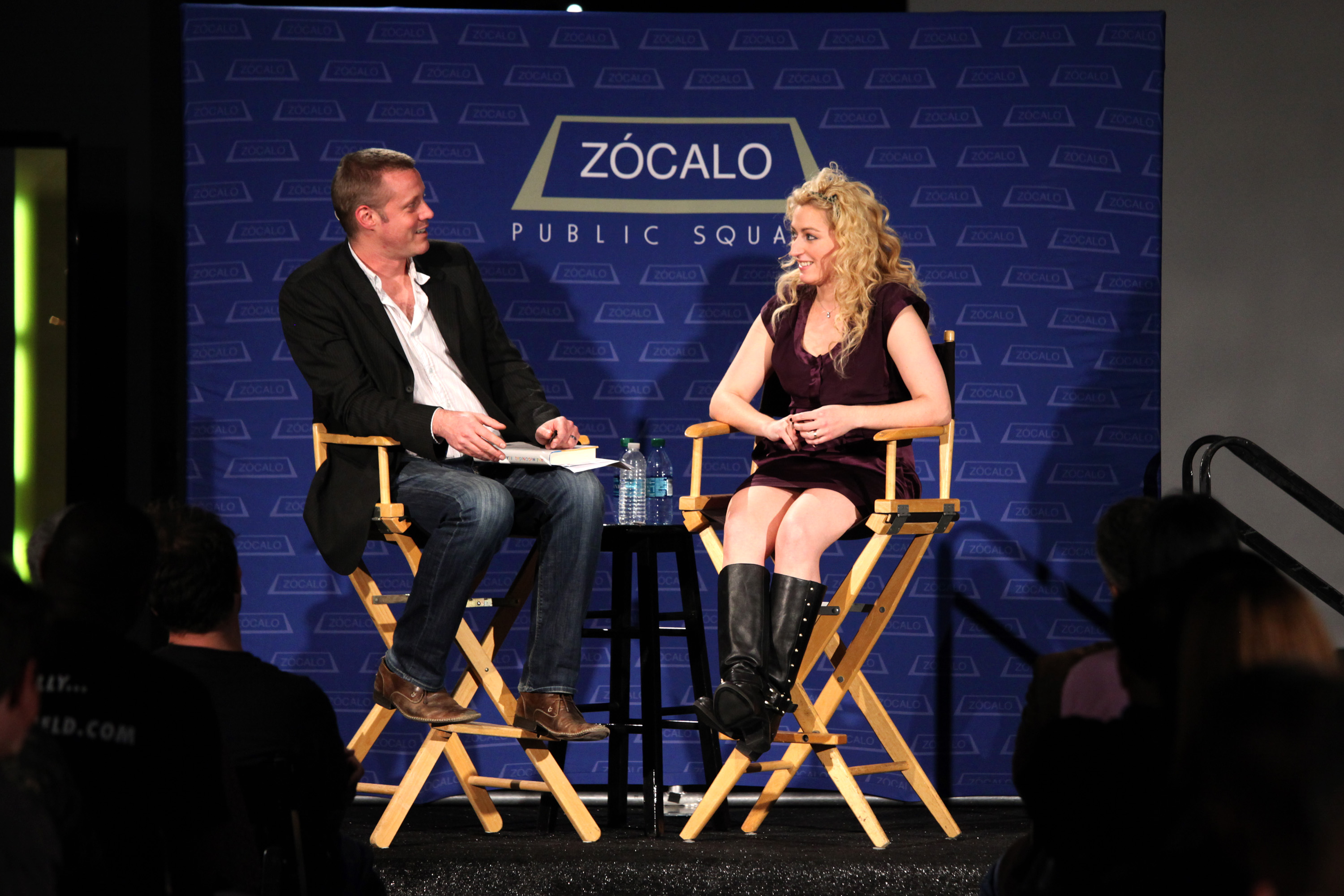
What if people all around you are playing a game?

“One of my favorite things to do is to have a secret mission when you go to events like this,” confessed Jane McGonigal, world-renowned game designer and author of Reality is Broken: Why Games Make us Better and How They Can Change the World. “It looks like I’m just here, but I actually have a secret quest going on in my head that you don’t know about.”
There are 500 million gamers on the planet. Over 170 million Americans play video games (McGonigal noted that 40 percent are women). If such trends continue, within 25 years most people will be gaming.
“By a show of hands, how many of you are gamers?” moderator Ze Frank asked the Zócalo crowd, sitting in a showroom of vehicles at The Petersen Automotive Museum. Over half raised their hands. “How many of you are suspicious of video games?” Two hands went up. “We can have it out afterward, near one of the Fords,” he quipped.
Before long, Frank (internet celebrity, digital savant and comedian) was using his casual wit to guide McGonigal into the deeply psychological aspects of gaming-highlighting positive international impact and the darker, more personal inspirations for her work.
Unnecessary Obstacles and Positive Stress
McGonigal tried to keep her definition of games expansive, citing archeological evidence of game addiction in the time of Herodotus.

“Games are unnecessary obstacles that we volunteer to tackle,” she stated. Instead of just picking up a ball and putting it in a hole, when we play golf we use a stick to hit it from hundreds of feet away. “There’s something about the absurdity that’s involved that’s necessary to invoke curiosity,” she said, distinguishing games from mere goal setting.
“Games are a way to get into a state of positive stress,” she explained. People become creative and social. They compare notes. McGonigal believes this kind of stress makes us better people and better company.
People think of games as the opposite of work, but they’re actually just as hard, McGonigal explained. Most work in real life feels like “we’re doing somebody else’s business,” McGonigal said. In that context, a challenge feels like pressure or anxiety. There’s not a middle ground of feeling capable or self-motivated. “Games are giving us that freedom to actually make that choice.” Games provide “opportunities to arise for the heroic occasion.”
Failure Stamina
Unfortunately, the real world has penalties. As someone pointed out during the Q & A, playing with real money is different from playing with fake money. “It’s tricky taking real world problems and putting them into games,” McGonigal conceded.
However, McGonigal believes that games help build failure stamina. Gamers spend 80 percent of the time failing, and, counter-intuitively, “Gamers are happiest right after they’ve failed,” McGonigal said, referencing studies.
“So why does failure suck so hard in real life?” Frank asked. McGonigal explained that gamers are getting constant feedback. They’re still engaged and motivated. In real life, people need “better opportunities to relish that we’re making an impact.”
Missions, from Personal to Global

Some games that McGonigal designed stemmed from needs she experienced in her own life. As an introvert who travels alone frequently, “I need a mission to get me out of my hotel room.” In one instance, she spelled words out with cookies and left them all over random cities.
More seriously, McGonigal experienced a debilitating concussion that changed her. “My book was due and I couldn’t read or write,” she said. She felt socially isolated and had severe symptoms of depression and anxiety, which were preventing her brain from healing. “I was on a very bad track,” she confessed.
She turned to games. She handed out missions to people who were close to her, naming them after characters from Buffy the Vampire Slayer. “It was the only way to be positive and keep my relationships,” she said. McGonigal took that personal experience and is now working with the health care industry to help devise programs for asthma management, smoking cessation and rehab for sports injuries.
The positivity didn’t stop there. McGonigal had a “wake up” moment a few years ago when working with the Institute for the Future. She said she realized that everyone on the planet could be working creatively for change. “Who on this planet isn’t capable of making a positive impact?” she asked. Through a program called Evoke, 51 companies, imagined by young people, were founded in India, the Philippines, Nigeria, and Uganda. “What, you don’t think games can save the world? Here we are, doing it.”
See photos here.
Watch a highlight of the conversation here.
Watch full video here.
Read an excerpt of Reality is Broken here.
Buy the book: Skylight Books, Powell’s, Amazon
Read our “In the Green Room” Q&A’s with Jane and Ze.
*Photos by Aaron Salcido




Send A Letter To the Editors